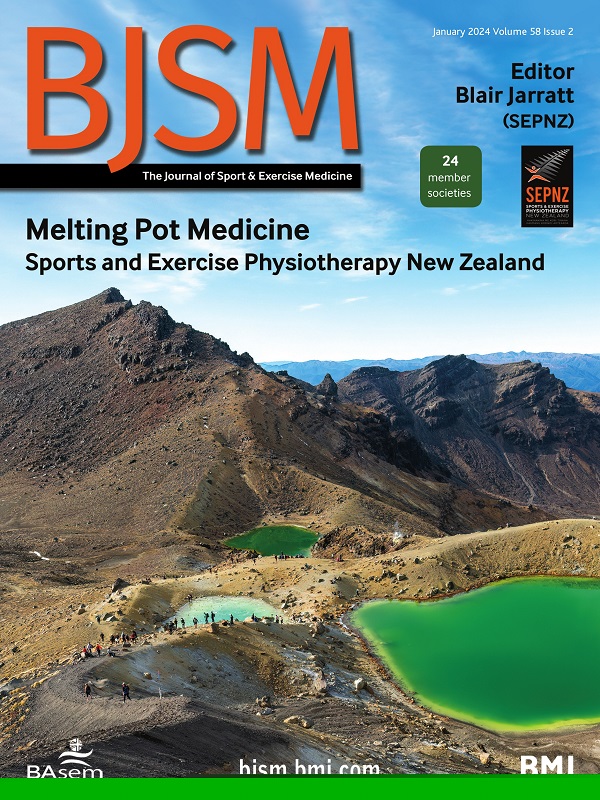Advancing gender equity in sport: a scoping review of international sport federation policies for pregnant, postpartum and parenting elite athletes
IF 16.2
1区 医学
Q1 SPORT SCIENCES
引用次数: 0
Abstract
Objective The aim was to synthesise international-level sport policies for pregnant, postpartum or parenting high-performance athletes in order to understand what policies currently exist and to identify policy gaps to be addressed. Design Scoping review. Data sources Online databases (MEDLINE, EMBASE, CINAHL, SPORTDiscuss, Evidence-Based Medicine Reviews (Ovid), Scopus, Web of Science and ClinicalTrials.gov) and Google up to 14 June 2024. Additionally, a targeted search of existing policies was conducted via the websites of International Federations (IFs) and continental sporting organisations (CSOs) in September 2023. Eligibility criteria We included policies from IFs recognised by the International Olympic Committee, and CSOs associated with the IFs that specifically address pregnant, postpartum or parenting athletes. Policies were a written principle of action adopted by the IFs/CSOs that provided any form of support during pregnancy, post partum or for parents. Results A total of 219 organisations (49 IFs; 170 CSOs) were identified and contacted, with 47/49 (96%) IFs and 15/170 (9%) CSOs responding. Sport policies related to pregnancy, postpartum or parenting athletes were identified from 20 IFs including (1) guidance on training/competition during and following pregnancy; (2) eligibility affected or training not advised; (3) protection from dismissal; (4) special rank, points or quota protection; (5) protections apply to adoption, surrogacy, miscarriage, stillbirth, egg freezing and/or fertility treatment; (6) duration of leave and if leave is paid and (7) breastfeeding support/space. No policies identified specific provisions for childcare support/space. Conclusions Less than half of all IFs have developed sport policies to support pregnant, postpartum and parenting athletes. Of the policies that do exist, most are limited in the extent to which they address the broad range of biopsychosocial supports that are necessary for facilitating optimal performance, enhancing long-term athlete health and addressing gender inequities that are deeply entrenched across all levels of sport. This review provides a critical piece of evidence needed to inform future policy development. All data relevant to the study are included in the article or uploaded as supplementary information.促进体育运动中的性别平等:对国际体育联合会针对怀孕、产后和养育优秀运动员的政策进行范围审查
目的是综合针对怀孕、产后或养育高性能运动员的国际水平体育政策,以了解目前存在的政策,并确定需要解决的政策差距。设计范围审查。数据来源截止到2024年6月14日,在线数据库(MEDLINE, EMBASE, CINAHL, SPORTDiscuss,循证医学评论(Ovid), Scopus, Web of Science and ClinicalTrials.gov)和谷歌。此外,2023年9月,通过国际单项体育联合会(IFs)和各大洲体育组织(cso)的网站,对现有政策进行了有针对性的搜索。我们纳入了国际奥委会认可的国际单项体育联合会的政策,以及与国际单项体育联合会有关的专门针对怀孕、产后或育儿运动员的民间社会组织的政策。政策是联合会/民间社会组织通过的书面行动原则,在怀孕、产后或为父母提供任何形式的支助。结果共有219家机构(49家IFs;发现并联系了170个cso,其中47/49 (96%)IFs和15/170 (9%)cso做出了回应。从20个IFs中确定了与怀孕、产后或育儿运动员相关的体育政策,包括:(1)怀孕期间和之后的训练/比赛指导;(2)资格受到影响或不建议进行培训;(三)免于解雇的保护;(四)特殊职级、积分、配额保护;(5)适用于收养、代孕、流产、死胎、卵子冷冻和/或生育治疗的保护;(6)休假时间和是否带薪休假;(7)母乳喂养支持/空间。没有政策确定儿童保育支助/空间的具体规定。结论:不到一半的国际单项体育联合会制定了支持怀孕、产后和育儿运动员的体育政策。在现有的政策中,大多数政策在解决促进最佳表现、提高运动员长期健康和解决在各级体育运动中根深蒂固的性别不平等所必需的广泛的生物心理社会支持方面的程度有限。这项审查提供了为未来政策制定提供信息所需的关键证据。所有与研究相关的数据都包含在文章中或作为补充信息上传。
本文章由计算机程序翻译,如有差异,请以英文原文为准。
求助全文
约1分钟内获得全文
求助全文
来源期刊
CiteScore
27.10
自引率
4.90%
发文量
217
审稿时长
3-8 weeks
期刊介绍:
The British Journal of Sports Medicine (BJSM) is a dynamic platform that presents groundbreaking research, thought-provoking reviews, and meaningful discussions on sport and exercise medicine. Our focus encompasses various clinically-relevant aspects such as physiotherapy, physical therapy, and rehabilitation. With an aim to foster innovation, education, and knowledge translation, we strive to bridge the gap between research and practical implementation in the field. Our multi-media approach, including web, print, video, and audio resources, along with our active presence on social media, connects a global community of healthcare professionals dedicated to treating active individuals.

 求助内容:
求助内容: 应助结果提醒方式:
应助结果提醒方式:


